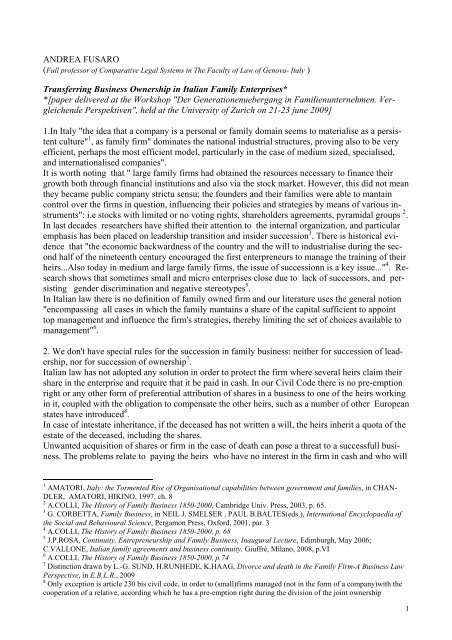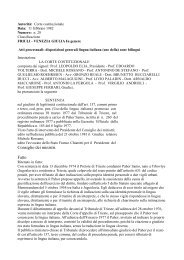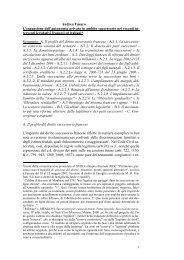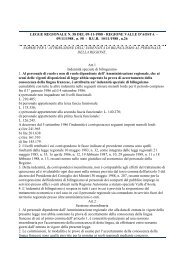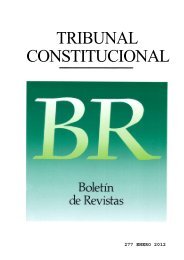ANDREA FUSARO Transferring Business Ownership in Italian ...
ANDREA FUSARO Transferring Business Ownership in Italian ...
ANDREA FUSARO Transferring Business Ownership in Italian ...
Create successful ePaper yourself
Turn your PDF publications into a flip-book with our unique Google optimized e-Paper software.
<strong>ANDREA</strong> <strong>FUSARO</strong><br />
(Full professor of Comparative Legal Systems <strong>in</strong> The Faculty of Law of Genova- Italy )<br />
<strong>Transferr<strong>in</strong>g</strong> <strong>Bus<strong>in</strong>ess</strong> <strong>Ownership</strong> <strong>in</strong> <strong>Italian</strong> Family Enterprises*<br />
*[paper delivered at the Workshop "Der Generationenuebergang <strong>in</strong> Familienunternehmen. Vergleichende<br />
Perspektiven", held at the University of Zurich on 21-23 june 2009]<br />
1.In Italy "the idea that a company is a personal or family doma<strong>in</strong> seems to materialise as a persistent<br />
culture" 1 , as family firm" dom<strong>in</strong>ates the national <strong>in</strong>dustrial structures, prov<strong>in</strong>g also to be very<br />
efficient, perhaps the most efficient model, particularly <strong>in</strong> the case of medium sized, specialised,<br />
and <strong>in</strong>ternationalised companies".<br />
It is worth not<strong>in</strong>g that " large family firms had obta<strong>in</strong>ed the resources necessary to f<strong>in</strong>ance their<br />
growth both through f<strong>in</strong>ancial <strong>in</strong>stitutions and also via the stock market. However, this did not mean<br />
they became public company strictu sensu; the founders and their families were able to manta<strong>in</strong><br />
control over the firms <strong>in</strong> question, <strong>in</strong>fluenc<strong>in</strong>g their policies and strategies by means of various <strong>in</strong>struments":<br />
i.e stocks with limited or no vot<strong>in</strong>g rights, shareholders agreements, pyramidal groups 2 .<br />
In last decades researchers have shifted their attention to the <strong>in</strong>ternal organization, and particular<br />
emphasis has been placed on leadership transition and <strong>in</strong>sider succession 3 . There is historical evidence<br />
that "the economic backwardness of the country and the will to <strong>in</strong>dustrialise dur<strong>in</strong>g the second<br />
half of the n<strong>in</strong>eteenth century encouraged the first enterpreneurs to manage the tra<strong>in</strong><strong>in</strong>g of their<br />
heirs...Also today <strong>in</strong> medium and large family firms, the issue of successionn is a key issue..." 4 . Research<br />
shows that sometimes small and micro enterprises close due to lack of successors, and persist<strong>in</strong>g<br />
gender discrim<strong>in</strong>ation and negative stereotypes 5 .<br />
In <strong>Italian</strong> law there is no def<strong>in</strong>ition of family owned firm and our literature uses the general notion<br />
"encompass<strong>in</strong>g all cases <strong>in</strong> which the family manta<strong>in</strong>s a share of the capital sufficient to appo<strong>in</strong>t<br />
top management and <strong>in</strong>fluence the firm's strategies, thereby limit<strong>in</strong>g the set of choices available to<br />
management" 6 .<br />
2. We don't have special rules for the succession <strong>in</strong> family bus<strong>in</strong>ess: neither for succession of leadership,<br />
nor for succession of ownership 7 .<br />
<strong>Italian</strong> law has not adopted any solution <strong>in</strong> order to protect the firm where several heirs claim their<br />
share <strong>in</strong> the enterprise and require that it be paid <strong>in</strong> cash. In our Civil Code there is no pre-emption<br />
right or any other form of preferential attribution of shares <strong>in</strong> a bus<strong>in</strong>ess to one of the heirs work<strong>in</strong>g<br />
<strong>in</strong> it, coupled with the obligation to compensate the other heirs, such as a number of other European<br />
states have <strong>in</strong>troduced 8 .<br />
In case of <strong>in</strong>testate <strong>in</strong>heritance, if the deceased has not written a will, the heirs <strong>in</strong>herit a quota of the<br />
estate of the deceased, <strong>in</strong>clud<strong>in</strong>g the shares.<br />
Unwanted acquisition of shares or firm <strong>in</strong> the case of death can pose a threat to a successfull bus<strong>in</strong>ess.<br />
The problems relate to pay<strong>in</strong>g the heirs who have no <strong>in</strong>terest <strong>in</strong> the firm <strong>in</strong> cash and who will<br />
1<br />
AMATORI, Italy: the Tormented Rise of Organisational capabilities between government and families, <strong>in</strong> CHAN-<br />
DLER, AMATORI, HIKINO, 1997, ch. 8<br />
2<br />
A.COLLI, The History of Family <strong>Bus<strong>in</strong>ess</strong> 1850-2000, Cambridge Univ. Press, 2003, p. 65.<br />
3<br />
G. CORBETTA, Family <strong>Bus<strong>in</strong>ess</strong>, <strong>in</strong> NEIL J. SMELSER , PAUL B.BALTES(eds.), International Encyclopaedia of<br />
the Social and Behavioural Science, Pergamon Press, Oxford, 2001, par. 3<br />
4<br />
A.COLLI, The History of Family <strong>Bus<strong>in</strong>ess</strong> 1850-2000, p. 68<br />
5<br />
J.P.ROSA, Cont<strong>in</strong>uity, Entrepreneurship and Family <strong>Bus<strong>in</strong>ess</strong>, Inaugural Lecture, Edimburgh, May 2006;<br />
C.VALLONE, <strong>Italian</strong> family agreements and bus<strong>in</strong>ess cont<strong>in</strong>uity, Giuffré, Milano, 2008, p.VI<br />
6<br />
A.COLLI, The History of Family <strong>Bus<strong>in</strong>ess</strong> 1850-2000, p.74<br />
7<br />
Dist<strong>in</strong>ction drawn by L.-G. SUND, H.RUNHEDE, K.HAAG, Divorce and death <strong>in</strong> the Family Firm-A <strong>Bus<strong>in</strong>ess</strong> Law<br />
Perspective, <strong>in</strong> E.B.L.R., 2009<br />
8<br />
Only exception is article 230 bis civil code, <strong>in</strong> order to (small)firms managed (not <strong>in</strong> the form of a company)with the<br />
cooperation of a relative, accord<strong>in</strong>g which he has a pre-emption right dur<strong>in</strong>g the division of the jo<strong>in</strong>t ownership<br />
1
sell the shares, or settl<strong>in</strong>g disputes among the heirs who take active part <strong>in</strong> the bus<strong>in</strong>ess and disturb<br />
the balance.<br />
Companions cannot only rely on a family agreement or a will, s<strong>in</strong>ce the member can amend it or<br />
withdraw.To strengthen their position, they can <strong>in</strong>sert transfer restrictions <strong>in</strong> the article of association<br />
or make shareholders' agreements which hamper the possibilities for heirs to acquire shares 9 .<br />
<strong>Italian</strong> law allows company transfer restrictions to be <strong>in</strong>cluded <strong>in</strong> the articles , clauses generally<br />
used to protect ownership <strong>in</strong> small and medium family-owned entreprises.<br />
A recent article describes four ma<strong>in</strong> types 10 . Two are <strong>in</strong> no way related to <strong>in</strong>heritance 11 . Other<br />
clauses work with <strong>in</strong>heritance. Prohibitive clause forbids all transfer of ownership, for a certa<strong>in</strong> period;<br />
it covers sales and gifts, even <strong>in</strong>heritance, on condition that the heir receives compensation.<br />
Post- sale purchase right provides the same rule of "first refusal", but after a person has acquired<br />
shares, giv<strong>in</strong>g the other shareholders an option to buy the shares, for a price settled accord<strong>in</strong>g to<br />
stipulations or determ<strong>in</strong>ed after negotiations. Further types of transfer restrictions are buy-sell<br />
clauses, mandatory for the heirs or for other shareholders. In the first case, other shareholders are<br />
obliged to buy the shares of the deceased, if the heirs want to sell. To protect ownership, the opposite<br />
is better suited , i.e. the clause accord<strong>in</strong>g to which the heirs are obliged to sell if other shareholders<br />
want to buy. This clause is common <strong>in</strong> Italy, even <strong>in</strong> the articles of association, provid<strong>in</strong>g<br />
mechanisms to determ<strong>in</strong>e the price.<br />
The problem is that the heirs must be compensated, and this often happens through dra<strong>in</strong>age of<br />
capital from the company, such as <strong>in</strong> the case of withdrawal; sometimes the partnership is dissolved<br />
and the bus<strong>in</strong>ess ceases.<br />
Some tools are used to plan successions and counteract drawbacks.<br />
3. Like everywhere else - quot<strong>in</strong>g Roland Krause- "family entrepreneurs face an unavoidable succession<br />
dilemma: they must make strategic decisions about transition<strong>in</strong>g ownership of the family<br />
bus<strong>in</strong>ess. The ma<strong>in</strong> alternatives are to sell the company to someone outside the family or to make<br />
arrangements for an <strong>in</strong>terfamily succession. In the latter case, there are many transition modes, e.g.,<br />
through a gift of shares, a will....". In Germany even a "mixed marriage/succession contract" is<br />
available, but <strong>in</strong> Italy succession agreements are prohibited. It fits that "the choice of succession<br />
mode is the outcome of an <strong>in</strong>teraction process between generations, with civil and tax laws determ<strong>in</strong><strong>in</strong>g<br />
the transactions costs of the different succession alternatives", and that "although succession<br />
problems are universal, transition methods adopted vary around the world as each country has its<br />
own tax system" 12 .<br />
The tools have been divided between those devoted to careful succession plann<strong>in</strong>g and emergency<br />
measures.<br />
4. Among emergency measures one f<strong>in</strong>ds the power of attorney post mortem, acknowledged before<br />
a public notary, that does not cease upon death of pr<strong>in</strong>cipal. This effect <strong>in</strong> Germany is stated by par.<br />
9<br />
L.-G. SUND, H.RUNHEDE, K.HAAG, Divorce and death <strong>in</strong> the Family Firm- A <strong>Bus<strong>in</strong>ess</strong> Law Perspective, quoted<br />
above<br />
10<br />
L.-G. SUND, P.-O. BJUGGREN, Protection of <strong>Ownership</strong> <strong>in</strong> Family Firms. The Owner and management Perspective,<br />
paper delivered at 1 st Bangkok International Forum on Indigenous Management Practice(BIFIM). 8-12 December<br />
2008, Kaesesart University, Bangkok, Thailand<br />
11<br />
Consent clause accord<strong>in</strong>g which" a shareholder who wishes to transfer his or her shares or a part of them, is obliged<br />
to ask for permission from the other shareholders, the board or the annual meet<strong>in</strong>g"; where the answer is negative, "the<br />
shareholder may be entitled to require the board to appo<strong>in</strong>t another buyer or make an appeal". Right of first refusal obligates<br />
the shareholder, who <strong>in</strong>tends to transfer the shares to <strong>in</strong>form other shareholders, or the board which will <strong>in</strong>form<br />
them. The others have an option to purchase the shares, for a price determ<strong>in</strong>ed <strong>in</strong> the clause or negotiated.<br />
12 th<br />
"Plann<strong>in</strong>g Succesion <strong>in</strong> International Family <strong>Bus<strong>in</strong>ess</strong>-Recent Developments <strong>in</strong> Germany", paper for the 13 World<br />
Conference of the International Society of Family Law. Vienna 16 – 20 September 2008; Section: F<strong>in</strong>ances and Freedom<br />
of Testation- Legitimate portion- Protection of surviv<strong>in</strong>g spouses and children<br />
2
672 BGB. In Italy the same result comes from the special rule set for entrepreneurs (which doesn't<br />
require notarisation) 13 , but this tool is very seldom used.<br />
5.Ord<strong>in</strong>ary ways to transfer firms to children are gifts and wills, but <strong>in</strong> Italy- like <strong>in</strong> most European<br />
countries- the transfer of bus<strong>in</strong>es ownership among generations must comply with the"legittima"<br />
and the proibition of succession agreements.<br />
<strong>Italian</strong> Civil Code protects spouses and children(ascendants too, <strong>in</strong> absence of descendants) by<br />
grant<strong>in</strong>g them the legitimate portion: they are entitled to a fixed portion of the deceased’s net estate;<br />
the law gives them the automatic right, apart from their wealth or need, irrespective of will or<br />
gifts.The follow<strong>in</strong>g are entitled to this statutory fixed share of the deceased’s estate. The spouse<br />
(husband or wife); the separated partner has the same right to the share of “legittima” of the non –<br />
separated partner, provided that the judge has not declared him/her responsible for the separation; a<br />
divorced partner does not have any right to the “legittima”. The children (legitimate, legitimated,<br />
illegitimate, or adopted). The ascendants: when no children (or their ascendants) are alive at the<br />
time of the deceased’s death.<br />
If one has willed property whose value exceeds the value of the disposable portion, the rights of the<br />
forced heirs are regarded as violated 14 . <strong>Italian</strong> law therefore allows the forced heirs to reduce the<br />
dispositions (and life donations) made <strong>in</strong> favour of third parties <strong>in</strong> a sufficient amount to guarantee<br />
the value of the so called “forced heirshp”. Donations are reduced after legacies, and"before ask<strong>in</strong>g<br />
for the reduction of donations, persons with a right to a reserved share must account for the value of<br />
the property given to the by the will. Donations are reduced start<strong>in</strong>g with the most recent and then<br />
work<strong>in</strong>g back to those made previously" 15 .<br />
In Germany-it has been po<strong>in</strong>ted out by Roland Krause- a peril to the family bus<strong>in</strong>ess is the risk of<br />
forced sale <strong>in</strong> the event of death, due to the compulsory portion of a testator's estate, if only one of<br />
the children of the bus<strong>in</strong>essman wishes to jo<strong>in</strong> the family bus<strong>in</strong>ess, and the others <strong>in</strong>sist on payment<br />
of the <strong>in</strong>heritance 16 .<br />
In Italy the situation is even worse, because compulsory portion is not only a credit, as it is Germany<br />
17 . Like <strong>in</strong> France before 2007 18 , and the other systems <strong>in</strong>fluenced by the French civil code, <strong>in</strong><br />
Italy the legitimate portion is the right to a share of the deceased’s estate. This solution h<strong>in</strong>ders the<br />
circulation of assets which are left by will or <strong>in</strong>testate succession, or by gift, because of the risk of<br />
claims on them by the members of the family who are protected through the rules on the legitimate<br />
portion.<br />
6.<strong>Italian</strong> Inheritance Tax - which is due also for gifts- was abolished <strong>in</strong> 2001 and re-<strong>in</strong>troduced <strong>in</strong><br />
2006 19 . It is levied at three different flat rates: 4% to the deceased'spouse and children; 6% to brothers<br />
and sisters; 8% to unrelated parties.<br />
For descendants and spouses, sisters and brothers we have a nil rate, the so calleed "franchigia". Inheritances<br />
of spouses and direct descendants are taxed on the amount exceed<strong>in</strong>g one million euros<br />
per beneficiary. Transfers to brothers and sisters on the amount exceed<strong>in</strong>g one hundred euros per<br />
beneficiary.<br />
13<br />
Article 1722, first paragraph, number four, civil code<br />
14<br />
Articles 743 and 564, V th par. civil code exclude profits ga<strong>in</strong>ed by a company of wich were members the heir and<br />
the deceised<br />
15<br />
F.SALERNO CARDILLO, Italy, <strong>in</strong> International Succession, Kluwer, 2004, 364<br />
16<br />
"Plann<strong>in</strong>g Succesion <strong>in</strong> International Family <strong>Bus<strong>in</strong>ess</strong>-Recent Developments <strong>in</strong> Germany", quoted above<br />
17 R. FRANK, Erbrecht, Verlag C.H. Beck, Muenchen, 2007, 255 ss.<br />
18 Y.-H. LELEU, La Réserve héreditaire en droit francaise et en droit luxembourgeois,<strong>in</strong> Examen critique de la reserve<br />
successorale, Tome II Droit Belge, Bruylant – Bruxelles, 1997, 81.<br />
19 Art. 2, par.42, d.l. 3.10.2006, n. 206, conv. by l. 24. 11. 2006, n. 286<br />
3
In 2006 fiscal treatment of transfers of firms was modified, through the abolition or reduction of <strong>in</strong>heritance<br />
and gift taxes. <strong>Bus<strong>in</strong>ess</strong> and substancial sharehold<strong>in</strong>g <strong>in</strong> a company, whatever the amount,<br />
is not taxed if they pass to the descendants of the deceased and if they undertake to cont<strong>in</strong>ue the<br />
bus<strong>in</strong>ess or control the company for at least five years 20 .Otherwise, <strong>in</strong> the value of shares and firms<br />
goodwill is not <strong>in</strong>cluded 21<br />
7.Our succession law reserves a dom<strong>in</strong>ant role to the will: article 458 of Civil Code denies the validity<br />
of succession agreements. The will must be personal, <strong>in</strong>dividual: article 589 prohibits jo<strong>in</strong>t<br />
and mutual wills.<br />
This makes proper estate plann<strong>in</strong>g difficult. In order to mitigate the consequences of these proibitions<br />
bus<strong>in</strong>ess or family agreements are used, so as to manta<strong>in</strong> a certa<strong>in</strong> number of management rules<br />
throughout the change of generations. To protect ownership <strong>in</strong> family firms some of the clauses<br />
above described are used. In the articles of the company whose members are the parent and only<br />
the child <strong>in</strong>volved <strong>in</strong> the bus<strong>in</strong>ess -not his/her sisters and brothers- we often <strong>in</strong>clude the buy-sell<br />
clause, mandatory for the heirs, that allows the child who is already a member (<strong>in</strong> the quality of<br />
shareholder) to buy all the shares of the deceased, pay<strong>in</strong>g full price.<br />
8. <strong>Italian</strong> law doesn't consider suitable family foundation. It is deemed to be <strong>in</strong>valid if it has no<br />
other object apart from keep<strong>in</strong>g assets for the benefit of a family, even though there is no esplicit<br />
legal prohibition, but only a doctr<strong>in</strong>al op<strong>in</strong>ion and an old case of our Supreme Court 22 , based on the<br />
rule aga<strong>in</strong>st Fidei-commissum, that family foundation would violate.<br />
9. Hereditary bus<strong>in</strong>ess ownership transfers have been studied deeply <strong>in</strong> Italy <strong>in</strong> last years, <strong>in</strong> relation<br />
to the use of legal <strong>in</strong>struments alternative to gifts and wills.<br />
It is well known that accord<strong>in</strong>g the 1994 Recommendation of the European Commission on the<br />
transfer of small and medium- sized enterprises 23 the Member States should consider allow<strong>in</strong>g the<br />
conclusion of future succession pacts.<br />
<strong>Italian</strong> scholars have <strong>in</strong>couraged the legislator to <strong>in</strong>troduce a new legal <strong>in</strong>strument, follow<strong>in</strong>g the<br />
model of family agreement used <strong>in</strong> practice to transmit ownership and management to one or more<br />
heirs, shaped <strong>in</strong> a way to avoid the risk of "azione di riduzione", the proceed<strong>in</strong>g that those with a<br />
right to a reserved share can br<strong>in</strong>g to have legacies or donations reduced.<br />
<strong>Italian</strong> legal tradition knows some similar patterns, especially "division by the testator", where the<br />
testator directs the division, specif<strong>in</strong>g how the portions are to be made; he can also state that the division<br />
be carried out accord<strong>in</strong>g to a valuation drawn up by a dis<strong>in</strong>terested third party 24 . But it takes<br />
effect under the provisions of a properly executed will, so that the transfer of the firm is postponed,<br />
it happens after death; on the contrary, often one wishes an immediate transfer, like a gift, under<br />
which title passes immediately to the transferee.<br />
Anther similar pattern wold be "donatio mortis causa" 25 : a gift made dur<strong>in</strong>g the life of the donor<br />
which is conditional upon, and takes effect upon, death. But it was verified <strong>in</strong> consistency with article<br />
458 civil code and the risults have usually been uncerta<strong>in</strong>.<br />
10. In order to facilitate the transfer of enterprises, succession rules have been reformed 26 , <strong>in</strong>troduc<strong>in</strong>g<br />
family agreements 27 .<br />
20<br />
Art. 3, par. 4-ter, d.lgs. 31.10.1990, n. 346, as amended by d.l. 3.10.2006, n. 206, conv. by l. 24. 11. 2006, n. 286<br />
21<br />
Art.8, par. 1-bis, d.lgs. 346/1990<br />
22<br />
Cass. 10. 7. 1979, n. 3969<br />
23<br />
OJ L385, 31. 12. 1994, p. 14(see also the communication conta<strong>in</strong><strong>in</strong>g the motivations of the recommendation:OJ C<br />
400, 31.12.1994, p.1), followed by the Communication from the Commission on the transfer of small and medium- sized<br />
enterprises(98/C 93/02)<br />
24<br />
F.SALERNO CARDILLO, Italy, p. 371<br />
25<br />
Lat<strong>in</strong>, mean<strong>in</strong>g "gift on the occasion of death"<br />
26 Through law nr.55, February 14 2006<br />
4
Under new articles of the Civil Code, "family agreement" is a contract through which, compatibly<br />
with the rules govern<strong>in</strong>g family firms and <strong>in</strong> obedience to the different company types, the entrepreneur<br />
transfers the firm, wholly or partially, and the stakeholder transfers, wholly or partially, his<br />
stakes to one or more descendants. It must be acknowledged before a public notary.<br />
All legitimate heirs and the spouse of the entrepreneur must partecipate <strong>in</strong> it, to consent to the<br />
assignment of ownership. They receive an equal value through the transfer of apartments or other<br />
assets as compensation, or they must waive any attribution <strong>in</strong> their favour (it is what the wife often<br />
does). They loose the chance to br<strong>in</strong>g later "azione di riduzione".<br />
Payment to other legitimates is made by the recipient of the firm or by the entrepreneur(mak<strong>in</strong>g another<br />
gift to the transferee of the firm).<br />
The entrepreneur cannot revoke the transfer, untill he is entitled to withdraw by the contract. The<br />
family agreement can entitle even the recipient of the firm to withdraw, i.e. if the bus<strong>in</strong>ess activity<br />
should not reach an average <strong>in</strong>come <strong>in</strong> the follow<strong>in</strong>g years.<br />
The entrepreneur can reta<strong>in</strong> the right of life usufruct. The transfer of title is normally immediate, but<br />
accord<strong>in</strong>g a doctr<strong>in</strong>al op<strong>in</strong>ion it is possible to postpone it, <strong>in</strong>troduc<strong>in</strong>g conditions or dates; i.e.<br />
provid<strong>in</strong>g that conditiona upon, and takes effect upon, death 28 .<br />
27 And add<strong>in</strong>g paragraph V-bis to Tiltle IV of the 2 volume of the Civil Code: articles 768 -bis and ff.<br />
28 A"Draft of a Family Agreement adapted from: I patti di famiglia e il trust, Le guide del professionista, Il sole 24 ore,<br />
30/03/06, pp. 15 e 16. (Family Agreements and Trust), has been translated <strong>in</strong> english by C.VALLONE,<br />
<strong>Italian</strong> Family Agreements and <strong>Bus<strong>in</strong>ess</strong> Cont<strong>in</strong>uity, quoted above<br />
5


